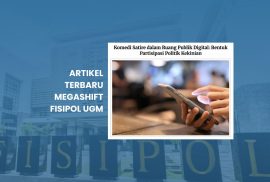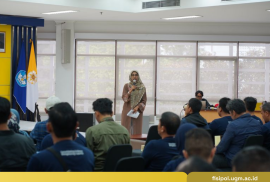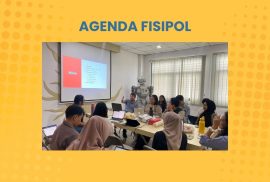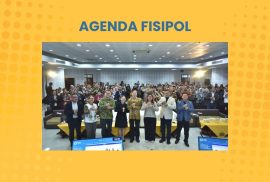Yogyakarta, September 3, 2025—As countries around the world navigate the challenge of fostering growth and addressing climate change, the governance of the mining sector will have profound implications for environmental sustainability, economic growth, and social justice. Addressing this issue, the Faculty of Social and Political Sciences (FISIPOL) of Gadjah Mada University (UGM), sponsored by the Academy of Medical Sciences, together with the University of Essex, as well as leading universities and institutes in Australia, South Africa, Kenya, and Europe, collaboratively hosted a networking conference titled “Climate Geopolitics and Sustainable Mining Governance” on September 3-4, 2025.
SDGs 16: Peace Justice and Strong Institutions
New Release: Megashift FISIPOL UGM Article
“Satirical Comedy in the Digital Public Sphere: A Contemporary Form of Political Participation”
By: Ardi Muhammad Rifqi
____________________
Megashift FISIPOL UGM has published a fresh article exploring how satirical comedy on social media has become a creative and powerful form of political participation in today’s digital era. Written by Ardi Muhammad Rifqi, the article dissects how humor, memes, and stand-up comedy content are reshaping political discourse in Indonesia.
The article highlights three main drivers behind the rise of satire: the accessibility of social media platforms, the growing popularity of stand-up comedy, and restrictions on free expression under regulations like the ITE Law. Within this context, satire emerges as a safe yet sharp tool for citizens to voice criticism and hold political actors accountable.
Yogyakarta, August 28, 2025—The Faculty of Social and Political Sciences (FISIPOL) Universitas Gadjah Mada (UGM) welcomed a group of participants from the Training on the Preparation of Strategic Plans (Renstra) for Regional Government Agencies of Bogor Regency. The program, facilitated by the Center for Capacity Development and Cooperation (PPKK) FISIPOL UGM, was designed as a campus tour and took place on Thursday morning (28/8).
The visit began with explorations to several faculties at UGM, including the Faculty of Forestry and the Faculty of Law, before concluding at the Faculty of Social and Political Sciences (FISIPOL). At FISIPOL UGM, the participants were welcomed by the Executive Secretary of PPKK, Dr. Pradhikna Yunik, followed by a presentation from Dr. Maharani Hapsari titled “Building Regional Competitiveness: Mapping Economic Potential and Innovation Based on Science and Technology.”
Yogyakarta, August 27, 2025 – The Faculty of Social and Political Sciences, Universitas Gadjah Mada (FISIPOL UGM), today graduated 216 undergraduate students during the 4th Graduation Period of the 2024/2025 Academic Year.
The graduates came from six departments, as follows:
-
International Relations (57 graduates)
-
Communication Science (65 graduates)
-
Public Policy and Management (28 graduates)
-
Social Development and Welfare (31 graduates)
-
Politics and Government (19 graduates)
-
Sociology (16 graduates)
For this period, Hanung Abdul Muqqit Ramadhan Anwar from the Department of Communication Science was named the Faculty’s Best Graduate with a GPA of 3.97 and a study duration of 3 years, 7 months, and 25 days.
The Institute of International Studies (IIS), Department of International Relations, Universitas Gadjah Mada (UGM), organized an enumerator training on Tuesday, August 26. This activity is part of a two-year research project titled Connect, Defend, and Act! (CDA), initiated by Hivos and the Humanis Foundation, with support from Norad – Norwegian Agency for Development Cooperation.
The training was designed to equip enumerators with skills in data collection, coding techniques, and interview methods to monitor the condition of civic space and democracy in Indonesia. The sessions were delivered by Daniel Petz and Nadya Zafira, both experienced in research on civil society and human rights issues.
Yogyakarta, August 23, 2025—The Faculty of Social and Political Sciences (FISIPOL) of Universitas Gadjah Mada (UGM), in collaboration with the Economic Research Institute for ASEAN and East Asia (ERIA), a Jakarta-based international think tank, held an international workshop titled “Asian Regional Approaches Towards Digital Trade Governance” on Saturday (August 23).
The workshop brought together researchers, academics, and practitioners from eight countries: Japan, South Korea, China, Australia, New Zealand, Indonesia, Vietnam, and the Philippines. The event was held in a hybrid format at the BB Building, FISIPOL UGM.
The Center for Capacity Development and Cooperation (PPKK), Faculty of Social and Political Sciences, Universitas Gadjah Mada (FISIPOL UGM), successfully organized the 4th Training on Developing Business Process Maps for Government Institutions on August 19–22, 2025, in Yogyakarta. The program was attended by participants from various ministries, agencies, and local governments across Indonesia.
Over the course of four days, participants received intensive training on the importance of business process mapping as the backbone of organizational efficiency. A structured process map not only ensures smooth operations but also helps government institutions function ethically, legally, and effectively in delivering public services.
Vandy Yoga Swara, lecturer at the Department of Social Development and Welfare (PSdK), Faculty of Social and Political Sciences (FISIPOL) Universitas Gadjah Mada, has recently published his latest scholarly work in the international journal Habitat International (Elsevier). The article, titled “River’s End: The Violence of Indigenous Riverine Urbanization in the Making of Indonesia’s New Capital,” was co-authored with Kei Otsuki and Femke van Noorloos (Utrecht University, Netherlands) as well as Michelle Kooy (IHE-Delft Institute for Water Education, Netherlands).
Yogyakarta, August 21st 2025─Amidst the bustling cafes, restaurants, shopping malls, and other venues where music is a key element of the atmosphere, a public debate has arisen regarding regulations for playing music in public spaces. This is especially true when news reports indicate that the government and music industry organizations (LMK) are reaffirming the obligation to pay royalties for playing Indonesian music in places like cafes, restaurants, hotels, and shopping malls. In fact, it’s not uncommon for this issue to be turned into memes or other digital jokes on social media.
The Center for Digital Society (CfDS), Faculty of Social and Political Sciences, Universitas Gadjah Mada (FISIPOL UGM), hosted the Information Resilience and Integrity Symposium (IRIS) 2025, an international academic and policy forum addressing the challenges of Generative Artificial Intelligence (GenAI).
The event was held in collaboration with the Safer Internet Lab (SAIL)—an initiative by the Centre for Strategic and International Studies (CSIS) and Google Indonesia—together with CfDS FISIPOL UGM. IRIS 2025 provided a cross-sector dialogue space to respond to the impacts of GenAI on democracy, digital security, and social life across the Asia-Pacific region.










